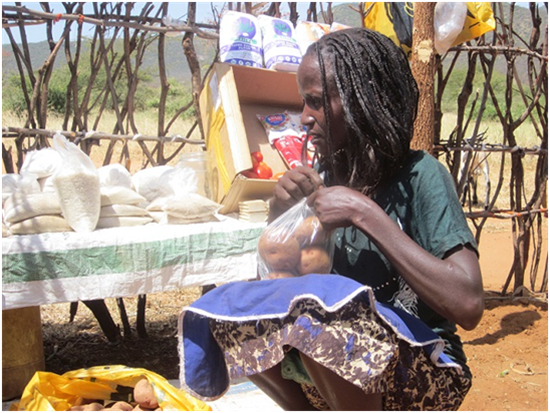
April 2014—Jenerica Aule, 32, is a widowed mother of four and the sole breadwinner for her family. Charcoal production and selling used to be her only source of income.
“The charcoal business is strenuous,” she says. “I used to make between 600 to 1,000 shillings [$7-$11] every two weeks, and this was not enough to meet our needs. When business was bad, my children and I would go without food.”
Climate change has become a reality in Aule’s village. Droughts and famine are becoming more frequent, wiping out herds of livestock traditionally kept as a source of income.
For many, charcoal, which is produced by burning wood, is now the only opportunity to earn money. But the trade is stripping rural areas of trees—negatively impacting the country’s climate. These forests store water during the rainy season and release it slowly, thus ensuring water flow during dry periods.
Through USAID support, a growing number of Kenyans are discovering ways to earn a better living without destroying the environment that sustains them. Aule is one of them.
With the information she learned at an alternative livelihoods training in March 2013, Aule was able to quit selling charcoal and start a small grocery business. The training taught Aule and her women’s group how to keep proper business records and determine profits and losses. They also learned about loans and loan repayment. Each member of the group now contributes 50 Kenyan shillings, or 50 cents, per week. From the collective savings, members are able to take out loans and repay them with interest.
In December 2013, Aule took her first loan of 800 Kenyan shillings ($9.50). She used the funds to increase her stock to meet the high demand during the Christmas period.
“I never knew that keeping 50 shillings would have such a big impact on my life. By saving 50 shillings every week, the stock in my shop—which was initially worth only 325 shillings [$4]—has now grown to 5,000 shillings [$59],” she said.
Aule can now afford to feed her family and consistently pay her children’s school fees.
Upon graduation, her group received certification that enables them to apply for the Women Enterprise Fund and other funds that give them access to financial services to grow their businesses over the long term. Aule and her group were among 115 graduates from the training program. Close to 2,600 people, the majority of whom are women, are now enrolled in the training program.
USAID is helping Kenyans find ways to earn a living that do not have detrimental effects on the environment. With access to financing and business training, Kenyans like Aule can start and sustain new livelihoods and build a solid foundation for green economic growth. Pastoral communities in Kenya’s northern arid and semiarid lands are learning to adapt to and bounce back from shocks such as drought and take actions to cope with the effects of climate change.
In 2013, USAID worked with nearly 144,400 people in Kenya's northern arid lands in activities focused on building resilience.
Launched in 2012, USAID's Resilience and Economic Growth in Arid Lands-Improving Resilience activity is implemented by African Development Solutions and its five consortium partners.
This activity is a key component of USAID Kenya's $70 million resilience program that focuses on strengthening social, economic and environmental resilience for vulnerable communities. As part of the larger U.S. Government global hunger and food security initiative, Feed the Future, the activity is strengthening and diversifying livelihoods, improving the management and productivity of natural resources, preventing conflict and improving nutrition.
Links
Follow @USAIDKenya, on Facebook, on Flickr, on YouTube







Comment
Make a general inquiry or suggest an improvement.